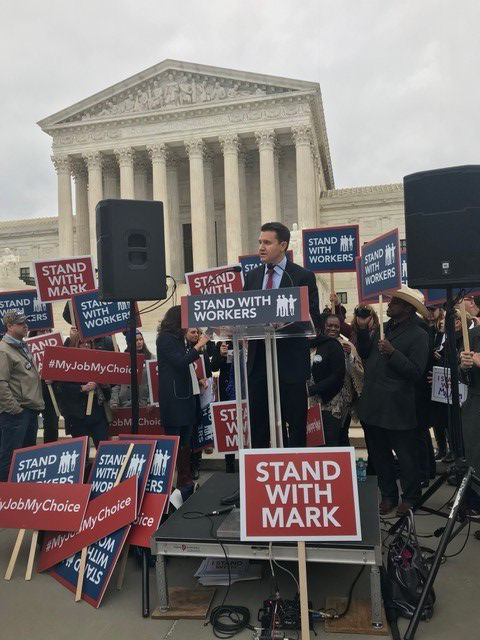Janus v. AFSCME: Can Government Employees Be Forced to Pay for Speech They Disagree With?
[youtube https://www.youtube.com/watch?v=N-7GJO1ieQY&w=560&h=315]
February 28, 2018
Mark Janus is a child support specialist for the State of Illinois, but to keep his government job he is forced to pay union fees that go to support policies he does not believe in. This week, the U.S. Supreme Court heard arguments in Janus v. AFSCME about whether that practice is constitutional.
“Every month, part of my paycheck goes to the American Federation of State, County and Municipal Employees,” Janus wrote in USA Today. “This is because long before I worked in this role, AFSCME was selected to represent the majority of state government employees in Illinois. When I was hired, no one asked me whether I wanted union representation. I only found out when the money started coming out of my paycheck.
“The union says it is advocating for me, but here is how I see it: At a time when Illinois is drowning in red ink and does not have the money to deliver core services, such as caring for the poor and disadvantaged, the union is wrangling taxpayers for higher wages and pension benefits for state workers — benefits that Illinoisans cannot afford. The union’s fight is not my fight.”

Jonathan Riches, the Goldwater Institute’s Director of National Litigation, explains in a new video that unions use money obtained from people like Janus to expand government through collective bargaining — a process over which those individuals have no say or control. That is considered compelled speech, Riches explains, and is a violation of the Constitution.
“Under the First Amendment, the state cannot compulsorily take money out of a state employee’s paycheck and give it to a government union for political activities,” Riches says. “If the Court agrees that collective bargaining is by its nature political, unions can no longer forcibly extract money from people who don’t agree with their activities.”
In December, the Goldwater Institute joined with organizations in California, Massachusetts, and elsewhere, to file an amicus brief in the Janus case.
Get Connected to Goldwater
Sign up for the latest news, event updates, and more.
Recommended Blogs

Donate Now
Help all Americans live freer, happier lives. Join the Goldwater Institute as we defend and strengthen freedom in all 50 states.
Donate NowSince 1988, the Goldwater Institute has been in the liberty business — defending and promoting freedom, and achieving more than 400 victories in all 50 states. Donate today to help support our mission.

We Protect Your Rights
Our attorneys defend individual rights and protect those who cannot protect themselves.
Need Help? Submit a case.


